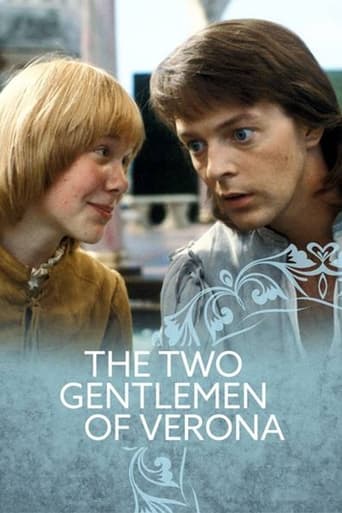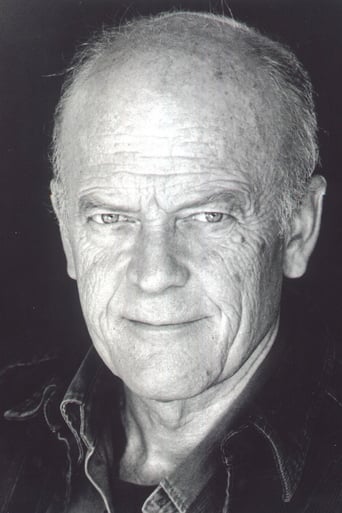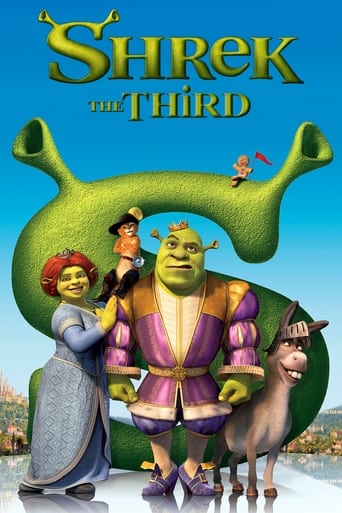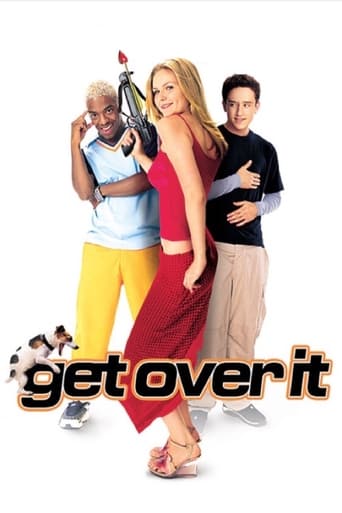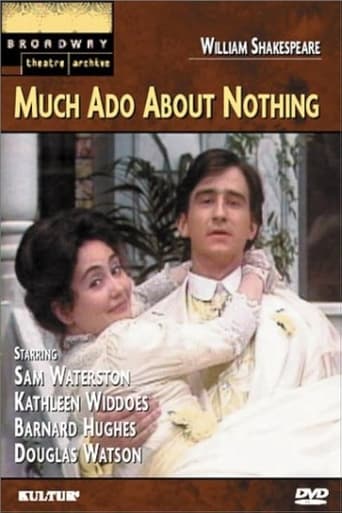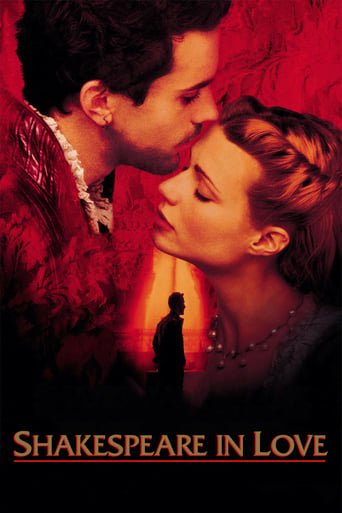The Two Gentlemen of Verona (1983)
Two great friends leave Verona for Milan, Valentine with great enthusiasm and Proteus unwillingly, as he will have to leave his recently-betrothered Julia. Valentine soon falls in love with Silvia, daughter of the Duke of Milan, but then Proteus meets the captivating Silvia... and he too becomes besotted.
Watch Trailer
Cast


Similar titles
Reviews
Absolutely Fantastic
All of these films share one commonality, that being a kind of emotional center that humanizes a cast of monsters.
Not sure how, but this is easily one of the best movies all summer. Multiple levels of funny, never takes itself seriously, super colorful, and creative.
Although I seem to have had higher expectations than I thought, the movie is super entertaining.
"The Two Gentlemen of Verona" is one of Shakespeare's weaker plays and when I read it I thought the turn of the action was psychologically so improbable that it couldn't be pulled off credibly. However, I find the acting in this film is excellent and especially the final scene is very well done. I really enjoyed watching it. Maybe the contrition of Proteus could have been a little stronger but I think there really was a convincing show of shame and regret when the meeting with Valentine made him realize how grossly he had betrayed his friend. There is a fine balance of tragical and comical elements throughout the play and the setting is lovely. I was particularly impressed by the performance of Tony Haygarth. His Launce is funny but not exaggeratedly clownish. The play cannot even begin to compare with masterpieces like "Twelfth Night" oder "Much Ado about Nothing", but this adaptation for the screen is great.
The Two Gentlemen of Verona is one of Shakespeare's first plays (maybe THE first), and it is rarely seen staged, much less filmed. So this BBC production is a treat and a gem to anyone who strives to familiarize themselves with all of Shakespeare, such as myself.And I must say the production enthused me thoroughly! The set is beautiful, and I am in prostrate awe of these amazing British actors, who can say the most incredible lines, as if these words had no other proper places than on the tongues of these very trophies of the thespian muse. Some scenes were very emotional, and the actors never did flinch an inch, but performed to perfection!The page, Speed, was the best cast member (I wonder how old he was at the time), and I will also single out both Julia and Valentine for da capo performances. Proteus was perhaps a bit oafish, and a bit gay, but he, too, was up to the task and did not disparage the whole. I thought Silvia had a few slightly boring scenes, but 'tis no great matter. The "bit with the dog" (as it is called in Shakespeare In Love), however, didn't contribute a terrible lot to the story, I thought. Launce was a minor character, only thrown in to please the bawdry-craving crowd, but it's possible he would have appealed to me more, had he been presented as more integral to the action - and as rather funnier than he was here.The way the language was spoken and enacted was very lofty. Rather too lofty for a comedy, perhaps. But the good people at BBC knew what they were doing: they were paying homage to Shakespeare's words, and as such felt obliged to focus more on the words than on the theatrics. A more frivolous staging might have been seen by others as less serious and timeless, and might forsooth have been so, if the comedy were not done very well indeed.And as for the story; yes, well, we all agree that it is not Shakespeare's best. Nor his second or third best, and so on. However, is it not a preliminary study to the rest of his works!? Two Gentlemen of Verona practically overflows with thematic references to a dozen or more of the later plays! To wit: We have four lovers running afoul of each other as in A Midsummer Night's Dream. We have a woman disguised as a man, as in several later plays (well, it was a common Elizabethan theme, and would have helped the boy actors to play female parts without having to act like women all the time). We have a band of forest outlaws, almost as the Arden Forest refugees in As You Like It. We have a Friar Laurence like in Romeo and Juliet, and Julia herself is surely an early version of Juliet. We have references to Milan, Mantua and Verona, all of which recur in later plays. I dare suggest that The Two Gentlemen of Verona is not so much a play as a list of ideas for Shakespeare's subsequent comedies, possibly even written down for the express purpose of serving as cues via the which he would remember what to put into his more mature plays years later. Shakespeare was no fluke; he knew what he was doing.To address the pivotal final scene with Proteus' repentance and Valentine's forgiveness; well, Proteus' lines do seem a bit brief to warrant such instant and total forgiveness, but I think the justification for this development should be expressed in the performance, by pausing the words to let the emotion in Proteus' face speak up. Or by arranging the situation and the scenes so that it becomes more clear that Proteus' regret is utterly genuine. This production did not pull this off in a convincing way, but I'm certain it can be done. It may be difficult, but I think it must be possible.But, overall, a GREAT production! What luck that we have the BBC to bestow upon us mere mortals such absolutely impeccably and consummately professionally realized masterworks. My humble thanks.9 out of 10.
If "Two Gentlemen" isn't the first of Shakespeare's plays, it might as well be. There are many themes here that are rough sketches for later, more fully developed works, but the play as a whole is a misfire, and this performance can't redeem it.The physical production is beautiful, and Crab, the dog, is an unfailing source of warmth and enjoyment. The human actors, however, are much more of a mixed lot, with none outstanding, some good, a handful perplexing and more than a few excruciating.A wise man once said, "Never tell an English actor he's in a comedy," and the first, sunny half of the play is a chore to sit through with all the mugging, rolling eyeballs and forced laughter. Once things get serious at about the midpoint the young cast is on a firmer emotional footing, however preposterous the plot. Shockingly, the final Shakespearean resolution, in which everybody forgives everybody and all the couples are united, for once does not produce the requisite spinal tingle.You may remember the beautiful sets. You will remember the dog. But you won't have that wonderful feeling of two or three hours in the exquisite company of Shakespeare, because this one just doesn't work.
I must admit that this production of one of Shakespeare's earliest plays (if not the earliest) is beginning to grow on me. I must be losing my critical judgment.Or it may be because I have learned to filter out the rubbish spoken by the main characters, and play full attention only when the clowns Speed (in this production played plausibly as an annoying boy by Nicholas Kaby) and Launce (played by Tony Haygarth) are speaking. Launce's classic speech to his dog Crab (the only other engaging character) about the trouble Crab has brought on him is the highlight of the play.It may be that this production (the only one of this play I have seen) suffers from the seriousness which is applied to all of the productions in this BBC series of the plays. I wondered on watching it how much better it might have been if the four main characters had played their lines for laughs. The absurd reconciliations in the final scene might then have had me rolling in the aisles rather than staring in disbelief. It is hard to believe that a writer as intelligent as Shakespeare could have intended to have those lines delivered po-faced, and harder still to believe that if he did anyone would have paid him to write another play

